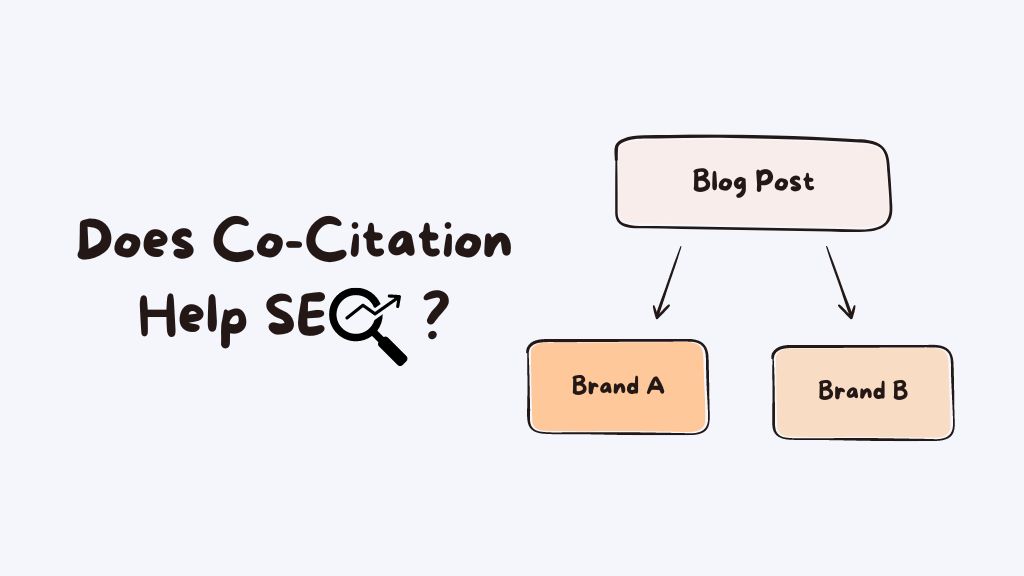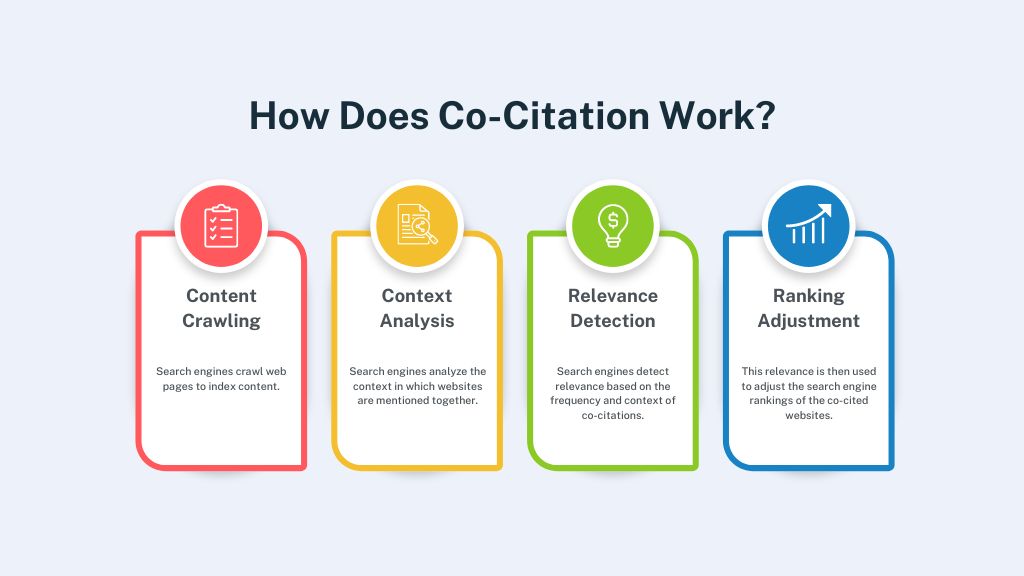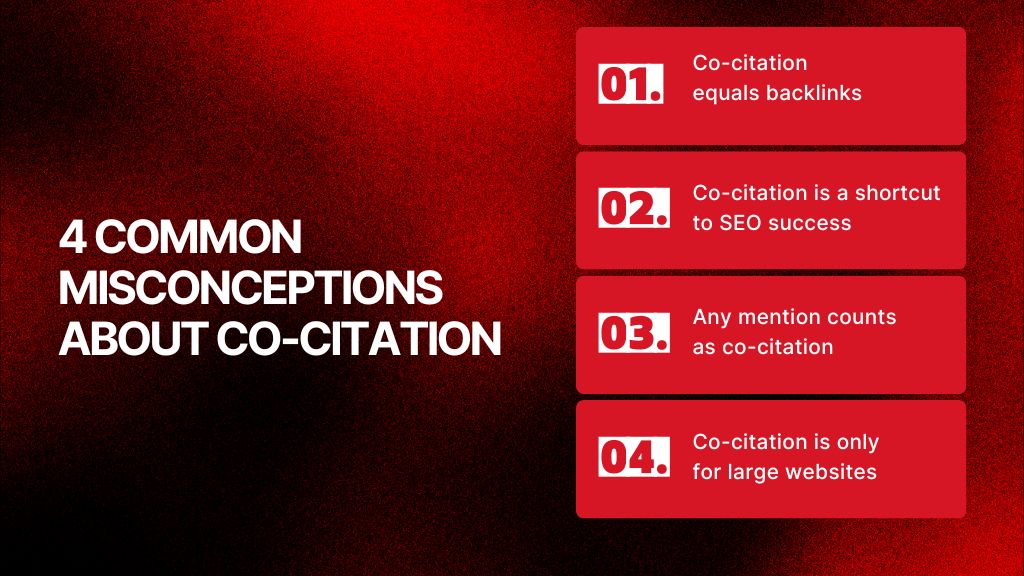Does A Co-Citation Help SEO?

If you’ve ever read “best of” lists and recommendations online, you may wonder whether getting your brand mentioned with other reputable brands can boost your SEO. For instance, if you have a keyword research tool, would it help If your brand is co-cited with more established software like Ahrefs and Moz?
Aside from falling on the radar of more potential customers, being associated with established and respected names in your industry may boost your authority in the eyes of search engines. We call this “co-citation,” and in this blog post, we’ll explore how co-citation can positively impact your SEO efforts.
In this article:
- What is Co-Citation?
- How Does Co-Citation Work?
- Benefits of Co-Citation for SEO
- Co-Citation vs. Co-Occurrence
- Practical Strategies to Leverage Co-Citation
- Common Misconceptions About Co-Citation
- Co-Citation Challenges and Limitations
What is Co-Citation?
Co-citation refers to the occurrence when two different websites or web pages are mentioned together by a third-party source. This can happen in various forms, such as:
- In an article where two websites are linked or mentioned in the same context.
- In a review where multiple brands or services are compared.
- On social media posts where different websites are tagged together.
What is a co-citation example?
Imagine an article about the best SEO tools mentioning both Moz and Ahrefs. Even if the article doesn’t link directly to these tools, the fact that they are mentioned together creates a co-citation.

How Does Co-Citation Work?
Co-citation works on the principle that search engines like Google use to understand relationships between websites. When two websites are frequently mentioned together, search engines start to recognize a connection between them. This recognition can influence how these websites are ranked for related search queries.
- Content Crawling: Search engines crawl web pages to index content.
- Context Analysis: They analyze the context in which websites are mentioned together.
- Relevance Detection: Search engines detect relevance based on the frequency and context of co-citations.
- Ranking Adjustment: This relevance is then used to adjust the search engine rankings of the co-cited websites.
Benefits of Co-Citation for SEO
1. Improved Relevance
When your website is co-cited with authoritative sites, it gains relevance. This is because search engines consider the association with trusted sites as a positive signal. Additionally, co-citation helps search engines understand the context and content of your site better. If your site is frequently mentioned alongside top industry players, it reinforces the idea that your content is also valuable and relevant to the same audience.
2. Enhanced Credibility
Being mentioned alongside well-known brands can boost your website’s credibility. This is particularly useful for new or lesser-known websites trying to build their reputation. It’s like getting a nod of approval from the big players in your field. When users see your site mentioned with reputable sources, they are more likely to trust your content, which can lead to increased traffic and engagement.
3. Better Ranking for Long-Tail Keywords
Co-citation can help improve rankings for long-tail keywords. These are longer, more specific search phrases that are often less competitive but highly relevant to user queries. Since long-tail keywords typically have lower search volumes but higher conversion rates, improving your ranking for these terms can drive more targeted traffic to your site. By being co-cited with authoritative sites, your site gains more visibility and relevance for these specific queries.
Co-Citation vs. Co-Occurrence
It’s essential to differentiate co-citation from co-occurrence, another concept in SEO.
- Co-Citation: Involves the mention of two or more websites together by a third party.
- Co-Occurrence: Involves the presence of related keywords within the same content.
While co-occurrence focuses on keyword proximity within content, co-citation emphasizes the relationship between different websites.
Practical Strategies to Leverage Co-Citation
1. Guest Blogging
Writing guest posts for reputable websites in your industry can lead to co-citations. When these websites mention your site along with other credible sources, it creates valuable co-citations.
2. Influencer Outreach
Collaborating with influencers who can mention your website alongside others in their niche can be a powerful co-citation strategy. Influencers often have a broad reach and their content can significantly impact SEO.
3. Content Creation
Create high-quality content that naturally mentions other authoritative websites. For example, a comprehensive guide or a comparative analysis that mentions top industry players.

Common Misconceptions About Co-Citation
1. Co-Citation Equals Backlinks
While both co-citation and backlinks are essential, they are not the same. Co-citation involves mentions without necessarily linking back to the websites, whereas backlinks involve direct links. Backlinks are hyperlinks that connect one website to another, directly influencing SEO. In contrast, co-citation relies on the context of the mention rather than the link itself. necessarily linking back to the websites, whereas backlinks involve direct links.
2. Co-Citation is a Shortcut to SEO Success
Co-citation is not a magic bullet. It should be part of a broader, well-rounded SEO strategy that includes quality content, backlinks, and on-page optimization. Relying solely on co-citation without supporting SEO practices will not yield significant results. It’s important to integrate co-citation into a comprehensive approach that addresses all aspects of SEO.
3. Any Mention Counts as Co-Citation
For co-citation to be effective, the context in which the websites are mentioned matters. Random mentions without relevance are less likely to impact SEO positively. The quality and context of the mention are crucial. If your website is mentioned alongside irrelevant or low-quality sites, it won’t help your SEO. Focus on getting mentioned in relevant, high-quality contexts to see real benefits.
4. Co-Citation is Only for Large Websites
Another misconception is that co-citation only benefits large, well-established websites. In reality, small and new websites can also gain from strategic co-citation. By being mentioned alongside reputable sites, smaller websites can build their credibility and improve their search rankings. This can be a powerful way for newer sites to gain visibility and authority in their niche.
Co-Citation Challenges and Limitations
While co-citation is beneficial, it does come with challenges:
- Measuring Impact: Unlike backlinks, the impact of co-citations is harder to quantify directly.
- Quality Control: Not all mentions are beneficial. Co-citations from low-quality or irrelevant sources can be detrimental.
- Dependency on Third Parties: Effective co-citation often relies on mentions from other reputable sources, which can be outside your control.
Building Your Authority
Co-citation is a valuable SEO tool that can enhance your website’s relevance, credibility, and search engine rankings. By understanding its mechanics and strategically leveraging it, you can gain a competitive edge in the digital landscape. Remember, co-citation should be part of a comprehensive SEO strategy, working alongside other essential elements to achieve optimal results.
Link Genius is a powerful SaaS platform designed to streamline your outreach campaigns, making it easier to gain backlinks and find guest posting opportunities. With features like automatic new site opportunities, exclusion filters, and personalized email templates, Link Genius makes managing and scaling your outreach campaigns simple and effective.
Join the waitlist today and start building authority without the complexity.
